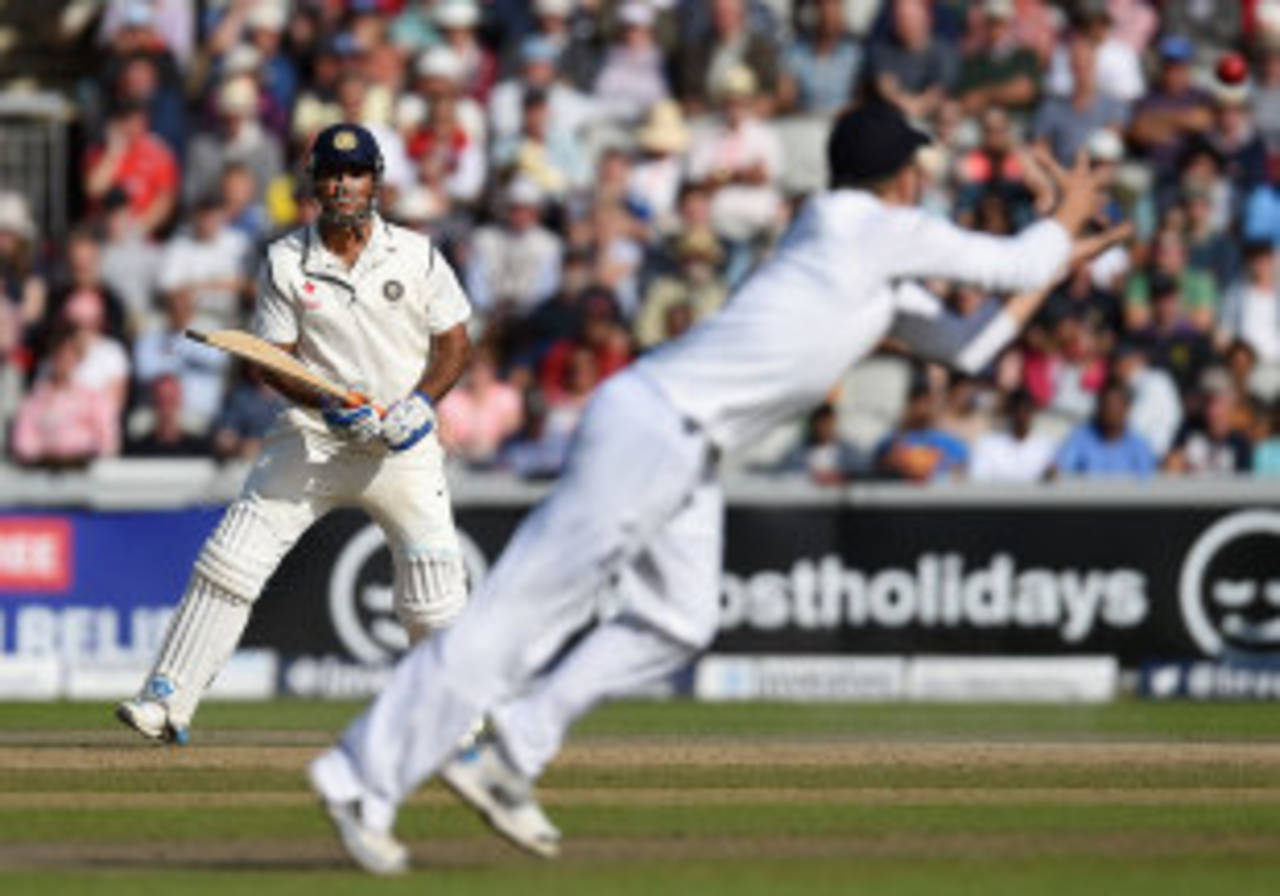Wet Sunday mocks Indian capitulation
It rained all day in Manchester on what would have been the fourth day of the fourth Test, had India not thrown away their wickets on Saturday
Sidharth Monga
Aug 10, 2014, 5:37 PM

With rain forecast for the last two days, some of India's dismissals, such as MS Dhoni's, reflected a clear lack of foresight • PA Photos
India's players better not have withdrawn the curtains in their hotel rooms on Sunday. For they will have seen rain that began early in the morning and refused to relent through the day. It did stop around 2pm, only to resume after a brief sunny spell. It wasn't the lashing apocalyptic rain that you associate with hurricanes, but persistent and steady downpour with cold breeze. When it finally seemed to have stopped by 4pm, down it came 20 minutes later, and stayed on and off since then.
On the second day of the Test, it had rained for much less time. It began to fall at around 2pm, and it was enough to wash out the rest of the day's play. Given the drainage problems the ground encountered after that sharp shower, it is highly unlikely there would have been any play on Sunday. There is an option of adding an extra hour at the end of the day's play, but for that play needs to start by 6pm.
This, of course, would have been the fourth day of the fourth Test. A Test on the third day of which India lost nine wickets in under one session. Had they batted more doggedly - everybody knew the forecast for day four - they could have kept the game alive. A whole day is lost, England get a little impatient, Stuart Broad is injured, and you never know what is liable to happen. There is more rain forecast for Monday. With the amount of rain Old Trafford has taken, who knows, even the fifth day might not have begun on time.
In an ideal world the coach Duncan Fletcher would drag the players by their coattails and take them to Old Trafford and show them what might have been. That would be too uncool, though. This team, we are told, is too cool for a rocket. Processes are important, not results. They can't afford to be seen as desperate. They live for the moment, they say; not the future, not the past. Test cricket is different. You have to plan ahead, and think of all sorts of permutations and combinations.
Virat Kohli nearly holed out to long leg sweeping Moeen Ali before he eventually fell to a meek push outside off. Ajinkya Rahane drove hard at Moeen and offered a simple return catch. MS Dhoni stepped out and was caught at midwicket. Bhuvneshwar Kumar ran himself out. This was not a team that was giving the outside chance an outside chance. Dhoni later said something to effect of, what is the difference how many days it takes you to lose; a loss is a loss.
When asked if any instructions were sent out to the batsmen keeping in mind the forecast, Dhoni said: "We are talking about a set of batsmen well experienced, not necessarily in Test cricket, but they have been part of the side enough to know what has to be done in each situation. We also tell them to break each session into small sessions of half an hour, and set small targets for them to achieve. That helps you to achieve what you want to, and as you said, bat 60 overs.
"If you look at it, 60 overs is a big target, and what you need to do is to break into four or five overs and set a target to achieve. That's the kind of spell bowlers go with - five or six overs. If you want to look at the positive, then all the batsmen have passed the tough passage when two bowlers were bowling well and then they have got out. Most of them have scored 20 to 30 runs before getting out. So the most important part is to convert those starts into big scores."
Make what you will of this.
This is similar to the time in Australia in 2011-12, when with one match to go in the triangular ODI series India had an outside chance of making it to the final. Journalists knew it, fans knew it, commentators knew it, but despite carrying a plethora of support staff, the Indian team didn't know it. Dhoni was informed of that outside chance at a press conference.
Maybe the lack of desperation, of fighting until you have been beaten officially, is a cultural issue. Even before Dhoni arrived, India showed similar lack of awareness in the West Indies in 2002, incidentally the last time India played five Tests in a series. There too, India had taken a 1-0 lead, squandered it, but on the final day of the series, Zaheer Khan slogged wildly, became the last man out and handed away the series to West Indies. Even before Zaheer reached the dressing room, it began to pour - as was expected. The presentation had to be held indoors, and it rained for two more days.
This is not to say India would have drawn this Test, but this is not about the end result, although chances of drawing this had India not lost on Saturday were greater than getting wickets by asking Ravindra Jadeja to bowl darts into the pads with a 7-2 leg-side field. This is about the process through which this defeat arrived. India should know, they care more for it than the results.
Sidharth Monga is an assistant editor at ESPNcricinfo